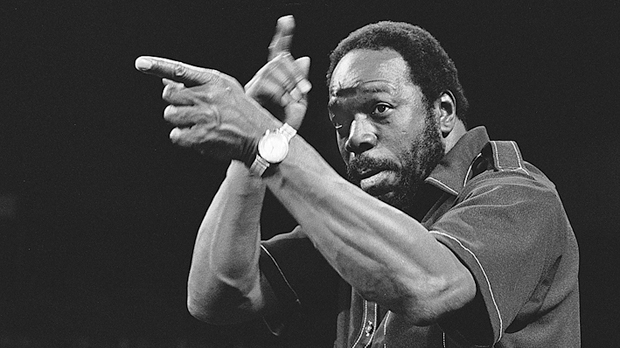Thad Jones’s 93rd birthday anniversary was March 28. Born in 1923, he was the middle of the three illustrious Jones brothers of Pontiac, Michigan (pianist Hank was born in 1918; drummer Elvin in 1927), and a triple threat as a trumpeter, composer, and bandleader/conductor. I love the small combo records he made in the fifties, the bulk of which were reissued by Mosaic Records some years ago. They remain the most concentrated collection of Thad’s tunes, and in the company of Billy Mitchell, Al Grey, Barry Harris, Kenny Burrell, and Tommy Flanagan, helped establish the impressive group of Detroit jazz artists who began making the New York scene in the fifties.
Charles Mingus featured Jones in one of his early Jazz Workshops, and he produced Thad’s first session as a leader for Debut Records. Mingus, never averse to superlatives, hailed him as the greatest trumpeter he’d ever heard. From The Jazz Experiments of Charles Mingus, here’s Thad with clarinetist John LaPorta and tenor saxophonist Teo Macero playing “What Is This Thing Called Love,” the 1929 Cole Porter tune whose sophisticated chord sequence was an inspiration to modern jazz players as early as 1945 when Tadd Dameron composed “Hot House” on its changes. Mingus worked with it for years, and here in 1954 blends Porter and Dameron.
Thad’s first decade of freelance work coincided with his nine-year tenure with the Count Basie Orchestra, which he joined in 1954. Thad essayed the famous “Pop Goes the Weasel” lick on Basie’s classic recording of “April in Paris,” and he and Joe Newman were the back-to-back trumpet soloists on Freddie Green’s delightful original, “Corner Pocket.” Here it’s Thad and Al Aarons, followed by Frank Wess on tenor saxophone.
My introduction to Thad was on records by the New York-based orchestra he co-founded with Mel Lewis in 1966. They were the new coin of the realm in big band jazz, and their studio albums for Solid State and Blue Note highlighted Thad’s writing and a parade of soloists that included Snooky Young, Bob Brookmeyer, Jerome Richardson, Joe Farrell, Pepper Adams, and Roland Hanna. For most of its members, the band offered a solid jazz refuge from the studio dates and television orchestras that employed them by day. Thad & Mel’s weekly appearance on Monday nights at the Village Vanguard garnered a lot of buzz in the late sixties and early seventies, a largely fallow period for jazz, and their joint legacy is enjoying renewed attention during this golden anniversary year of the band’s founding. This PBS feature focuses on the Vanguard Jazz Orchestra, a direct descendant of the Thad Jones-Mel Lewis Jazz Orchestra.
Here’s beautiful footage of Thad & Mel (center stage), with solos by baritone saxophonist Pepper Adams and bassist Richard Davis soloing on Thad’s “Three and One.”
